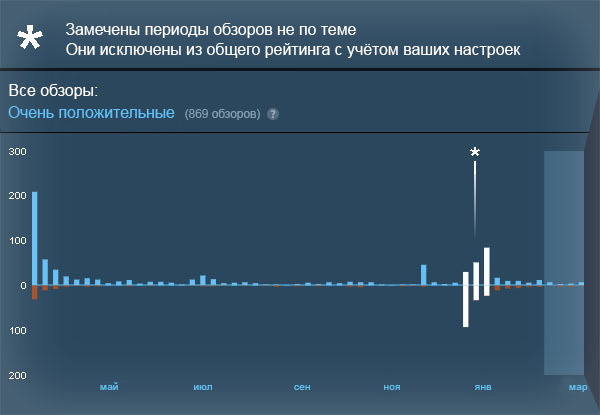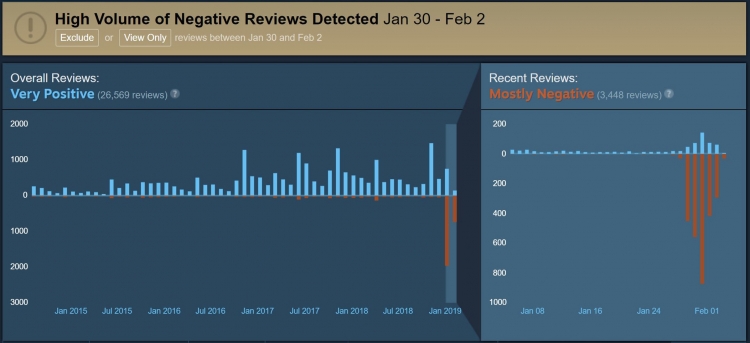Valve Starts Fighting Offshore Negative Reviews

Valve changed its user review system two years ago , as well as the impact of such reviews on game ratings. This was done, in particular, to solve problems with the “attack” on the rating. The term "attack" means the publication of a large number of negative reviews in order to lower the rating of the game.
According to the developers, the changes should give each player the opportunity to speak out about a particular game and its purchase. In the end, this will lead to the formation of a rating that can tell customers whether they like the game or not.
Since the introduction of changes, Valve, according to company representatives, tried to listen to both the opinions of the players and the feedback of the developers. Both the former and the latter are aware of the benefits or harms that negative reviews can do, and in some situations this tool is still in use.
Valve has developed analysis tools to keep track of reviews. After the data and opinions of users were obtained and studied, Valve came to the conclusion that they were ready for new changes.
The main change is the introduction of an off-topic monitoring system for reviews to exclude them from the overall rating. Such reviews are those whose arguments "do not affect the desire to buy this product." Well, since there are no “right” arguments, reviews of this type will not be taken into account in the ranking.
For example, reviews that are somehow related to DRM will no longer be taken into account. On the other hand, the reason for the negative reviews will be indicated. Here is what the developers themselves say : “Strictly speaking, they are not part of the game, although they disturb some players, so we decided that these complaints were off topic. In our opinion, the majority of Steam users are not interested in such questions, so the rating of the game by reviews would be more accurate without them. Moreover, we believe that players interested in DRM are often ready to carefully check the game before buying, so we decided to leave in the open access even reviews from off-topic attacks. From them you will find out whether the reason for the negative reviews is important to you. ”
The company understands that players may be interested in a relatively wide range of issues, and there will be a very ghostly line between the reviews “off topic” and “off topic”. In order to understand where good and bad, the company introduced a monitoring system for negative reviews. It recognizes uncharacteristic activity of any type in real-time reviews of all games on Steam. Moreover, the system “does not try to find out the cause” of the unusual situation.
As soon as such activity is identified, Valve employees are notified who begin to study the problem. According to the developers, the system has already been tested in practice by checking the entire history of Steam reviews. Result - many reasons were found for why something unusual was happening. Moreover, there were not so many attacks with off-topic reviews.
When the team of moderators determines that the activity detected by the monitoring system is associated with a similar attack, work begins to level the influence of the “review bomb”. So, the time interval of the attack is noted. Reviews during this time are not taken into account when calculating the game rating. Well, no one removes the reviews themselves, they remain untouchable.

If desired, the user can always abandon the new system. There is an option in the store’s settings, which, as before, takes into account all the reviews when compiling the game rating.
One of the striking examples of the “attack by reviews” is a flurry of negativity after Metro Exodus left Steam in favor of exclusive placement in the Epic Games Store. The placement period is valid until February 2020. The creators of the game, most likely, had serious reasons to do this, but they were not understood by the players. They began to leave not only negative reviews, but also put dislikes under the trailers on YouTube, as well as complaints and complaints wherever possible.

The graph above shows clearly that after a certain moment the number of negative assessments increased very sharply. This moment is the departure of the third part of Metro from Steam. And if before the “Very positive” reviews there was an overwhelming majority - more than 80%, then after them it became many times smaller, negative reviews began to prevail.
